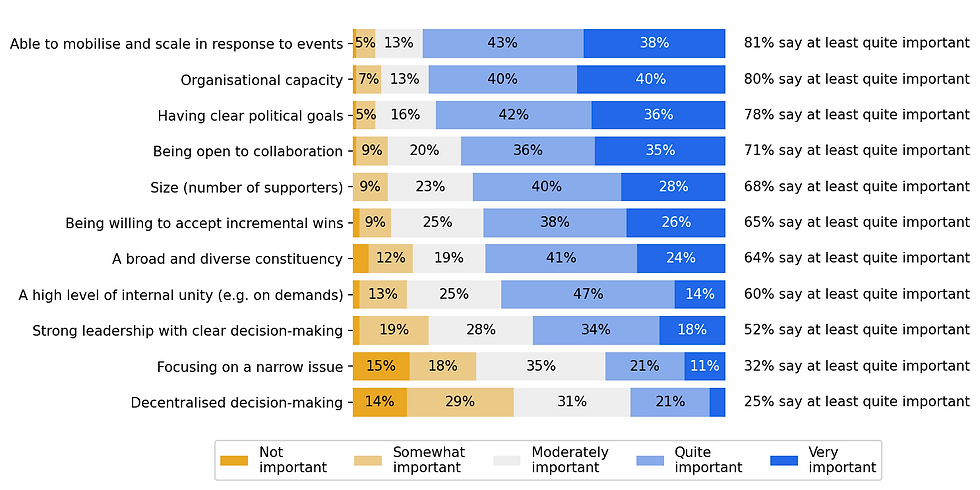New Research! Expert survey on social movements and protest
- James Ozden

- Jul 7, 2023
- 3 min read
I’m very excited to release some new research we’ve been working on for a while! We teamed up with the amazing Apollo Academic Surveys to create an expert survey of academics who study social movements and protest. We surveyed 120 academics across Political Science, Sociology and other relevant disciplines, and picked many academics because we thought they had made significant contributions to the understanding of social movements and protest.
You can see the full results on the Apollo Academics Surveys website here, but we wanted to share a few findings we found really interesting. Please also check out James’ thread on twitter and give it a retweet if you find it useful or interesting! You can also share this article in the Guardian that covers our research (which spent some time on the home page and should be in the papers tomorrow!).
In one question from the survey, 69% of experts thought that disruptive tactics were effective at progressing the cause for issues like climate change that have high public awareness and high public support. This is in stark contrast with polling by YouGov which finds that 78% of the UK public thinks that disruptive protest hinders the cause.

Figure 1: Answer to the Question 7 from the survey: “Please indicate how effective disruptive protest might be in the following contexts. By 'effective', we mean bringing about overall positive outcomes. In the case of the climate movement, this would look like a reduction in greenhouse gas emissions, either through direct effects on policy, or indirect effects on policy or individual behaviour via increased public awareness and support for the issue.
Out of the factors we asked about, experts thought the most important tactical and strategic factor for a social movement’s success is “the strategic use of nonviolent disruptive tactics”. They ranked it as more important than focusing on gaining media coverage or having achievable demands. Overall, 69% of experts said “the strategic use of nonviolent disruptive tactics” was either “very important” or “quite important”.

Figure 2: Answers to Question 3 from the survey: “How important do you think the following tactical and strategic factors are in contributing to a social movement’s success?
We were really struck by the contradiction between what the public and media say about disruptive protests and what academics said. The experts who study social movements not only believe that strategic disruption can be an effective tactic, but that it is the most important tactical factor for a social movement's success (of the factors we asked about). This, and other relevant evidence, points out how we shouldn’t necessarily take people’s first reactions as the indicator of an effective protest.
Experts were also asked which factors of a social movement’s governance are the most important in driving success. The highest rated factor was 'the ability to mobilise and scale quickly in response to external events' and funnily enough, last was 'decentralised decision-making'.

There are plenty more questions in the full results on Apollo’s website so we highly recommend checking them out in full! We’ll aslo be releasing our own report, with greater analysis, on this data soon. Here are some samples of other stuff we asked about which you can see in the results:
The extent to which a social movement’s success is related to factors within their control (e.g. tactics and strategy) vs factors outside their control (e.g. wider political context)
The most common reasons social movement fail to achieve their goals
How important it is for protest tactics seem to “make sense” and the trade-offs between targeting bad actors - eg fossil fuel companies directly vs targeting those such as art galleries who are more indirectly involved'
To what degree polarisation is inevitable or necessarily a bad outcome
We also asked specific questions about the climate and animal advocacy movements. And there were two open response questions: what did experts think has been the most successful social movement in the past 20 years and what was the main piece of advice they would give to activist groups. Do take a look.




Comments